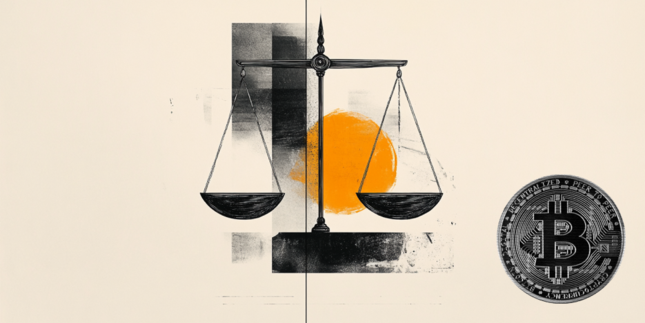BITCOIN NEWS, ANALYSIS AND FORECAST
Latest Bitcoin News
Bitcoin Technical overview
Big picture
Cryptocurrencies bullish themes
Cryptocurrencies bearish themes
SPECIAL WEEKLY FORECAST
Interested in weekly BTC/USD forecast? Our experts make weekly updates forecasting the next possible moves of the bitcoin-dollar pair. Here you can find the most recent forecast by our market experts:

Bitcoin: BTC demand and liquidity conditions remain weak
Bitcoin (BTC) price has been consolidating between $94,000 and $100,000 since early February, hovering around $98,000 at the time of writing on Friday.
Latest Bitcoin Analysis
Editors' picks

Bitcoin Weekly Forecast: BTC demand and liquidity conditions remain weak
Bitcoin price has been consolidating between $94,000 and $100,000 since early February. US Bitcoin spot ETF data recorded a total net outflow of $489.60 million until Thursday.

Sonic (prev. FTM) rallies as TVL hits record high and market capitalization surpasses $3.1 billion
Sonic (S), previous Fantom (FTM), rallies over 20% in the last 24 hours and trades around $0.90 at the time of writing on Friday after rising almost 64% this week. The migration of FTM to S token at a 1:1 ratio was completed on January 17.

Top 3 Price Prediction Bitcoin, Ethereum, Ripple: BTC gears up for volatility while ETH and XRP fight to stay afloat
Bitcoin price has been consolidating between $94,000 and $100,000 since early February; this consolidation phase could soon end. Ethereum price shows signs of strength while Ripple price fights to stay afloat.

Crypto Today: BTC tops $98K on US-Russia diplomacy, while NEAR and Bittensor lead AI tokens’ $30B rally
The global crypto market rose 3% on Thursday, adding $45 billion to reach an aggregate market cap of $3.2 trillion. The crypto AI sector witnessed a 15% rally, with Bittensor (TAO) and NEAR emerging as top performers on the day.

Bitcoin: BTC demand and liquidity conditions remain weak
Bitcoin (BTC) price has been consolidating between $94,000 and $100,000 since early February, hovering around $98,000 at the time of writing on Friday.
BTC
ETH
XRP
WHAT IS BITCOIN?
Bitcoin (BTC) is the universal payment system originally launched as an open-source software in 2009 by the person or group of people known as Satoshi Nakamoto. Unlike the classic banking models, Bitcoin has qualities such as anonymity or decentralization thanks to the blockchain technology that is used to validate the transactions. Due to these characteristics, user interest in this digital currency has been increasing, which has generated an enormous volume of cryptocurrencies being issued to the market following the Bitcoin pattern.
The first and most popular cryptocurrency
Currently, the Bitcoin is the cryptocurrency that has the biggest nominal market price and the largest market capitalization. Its importance is such that it is considered unique, treating the rest of digital currencies as Alternative Coins (altcoins). In this group, we can find open source systems such as Ethereum, Ripple or Litecoin.
High volatility
There are many factors that condition the high volatility of Bitcoin´s price. Similarly to what happens with common assets and the currency pairs in the foreign exchange market, the increasing or decreasing interest of the public raises and/or lowers its market price. However, it also has certain specificities such as the absence of current regulation or pressure from governments. This keeps its value in constant movement, that the individual investor should frequently confront with the Bitcoin technical analysis.
Bitcoin mining
The individual investor should differentiate the anonymity of the cryptocurrencies with the fact that transaction processes are recorded and validated using the Blockchain technology. Otherwise, the Bitcoins pass-through information would not be available. However, the process of performing this data recording requires a high computational work, as well as a lot of time.
To do the mining, individual processes are carried by the users, who are responsible for recording that information in blocks, which will join the unchanging blockchain. On the other hand, as a reward, the miners will obtain for their collaboration a small number of bitcoins in the process known as Bitcoin mining. Likewise, this term also applies to the creation and distribution of Bitcoin. According to the latest Bitcoin News, the total number of Bitcoin mined is about the half of the total number of Bitcoin created during the previous year. Such diminishing number of newly mined Bitcoin means that the total number of 21 million Bitcoins in circulation will only be created by 2030.
Bitcoin Futures
The introduction of Bitcoin futures on regulated trading venues was regarded as a significant milestone in bringing the digital currency closer to mainstream investing. While some sceptics still believe that crypto assets are too risky and speculative for long-term investment purposes, crypto enthusiasts hope that futures trading would bring institutional money to the industry. Let's have a closer look at what is a Bitcoin futures contract and how to capitalize on it.
In essence, Bitcoin futures represent an agreement to sell or buy a certain amount of an asset on a particular day at a price that was fixed beforehand, and to that extent, they are no different from any other derivative financial instrument of the kind, be it futures for corn, oil or soybeans.
Companies and businesses buy futures to fix the price for a specific time period, which gives them the luxury of price stability even on volatile markets, while investors often use futures for hedging risks or speculations as the value of the futures contracts is based on the overall performance of an underlying asset.
In December 2017, two Chicago exchanges - CME and CBOE - launched Bitcoin futures trading, and thus unlocked the cryptocurrency market for institutional investors. The exchanges guarantee that the parties of the futures contract fulfil their respective obligations based on the applicable legislation. It means that the market players that were discouraged by an unregulated stance of the digital asset got a handy tool to gain exposure or hedge Bitcoin and benefit from the price fluctuations.
Bitcoin Wallets
Bitcoin Wallets are private systems where individual investors store their Bitcoin mined or obtained through transaction or sale of services. According to their characteristics, the Bitcoin Wallets are classified into 4 different models:
- Web: One of the most commonly used options due to the speed at which it operates. This means a web hosting from where investors carry out all their transactions.
- Desktop: For desktop wallet, investors must download a special application to their computers or mobile phones. Certain operations, such as balance inquiry, do not require an internet connection.
- Hardware: One of the safest options to hold the Bitcoin wallet is the hardware. They work as physical external hard drives where investors store information about the total balance in a very reliable way.
- Paper: Along with the hardware wallets, the safest option. However, its process is slower requiring its passage through the online Wallet.